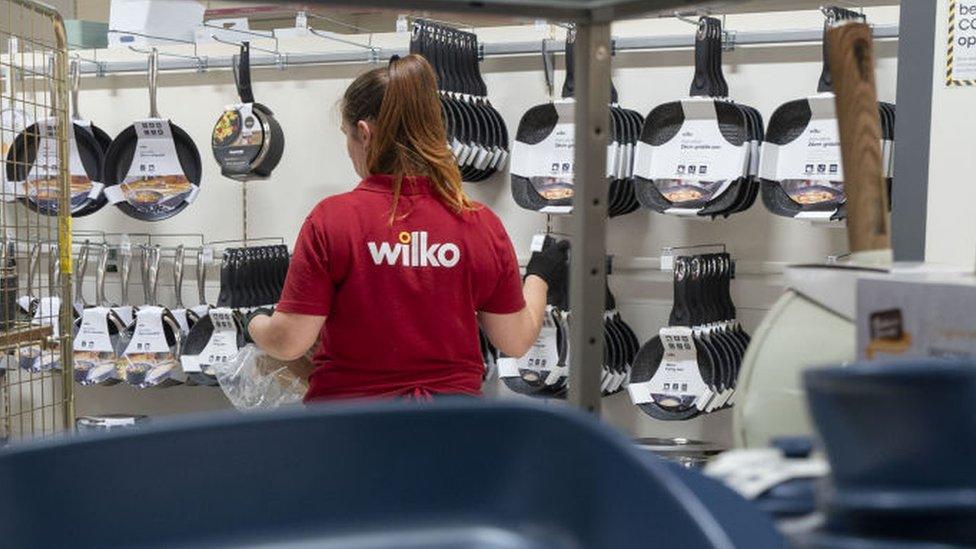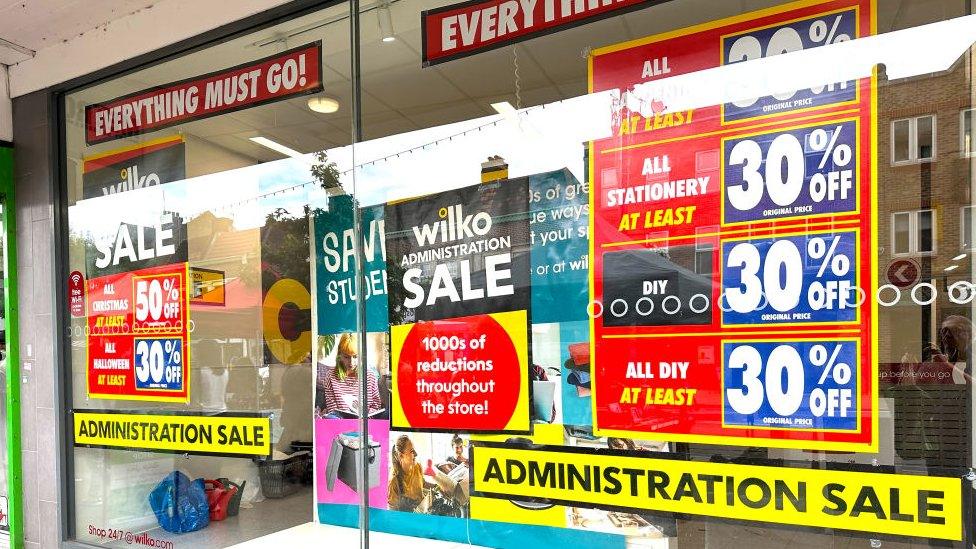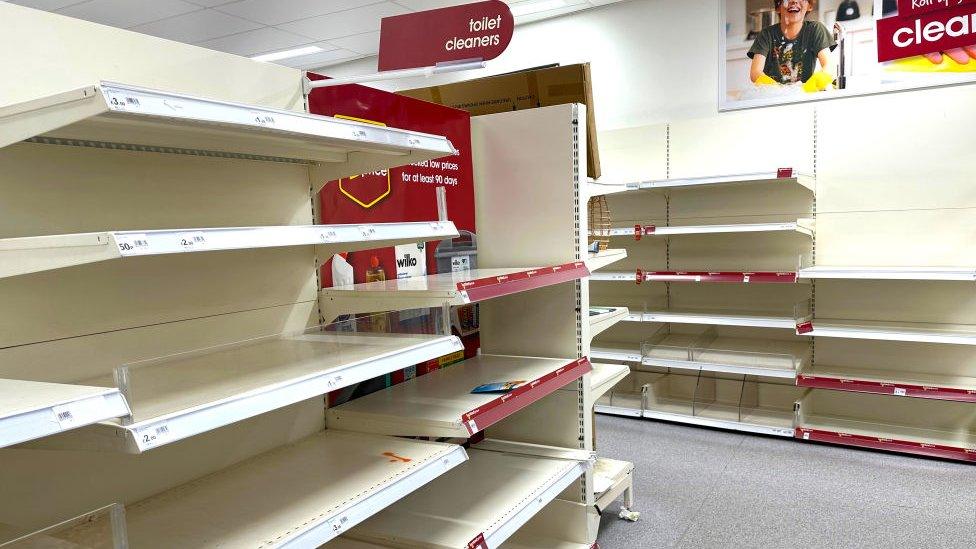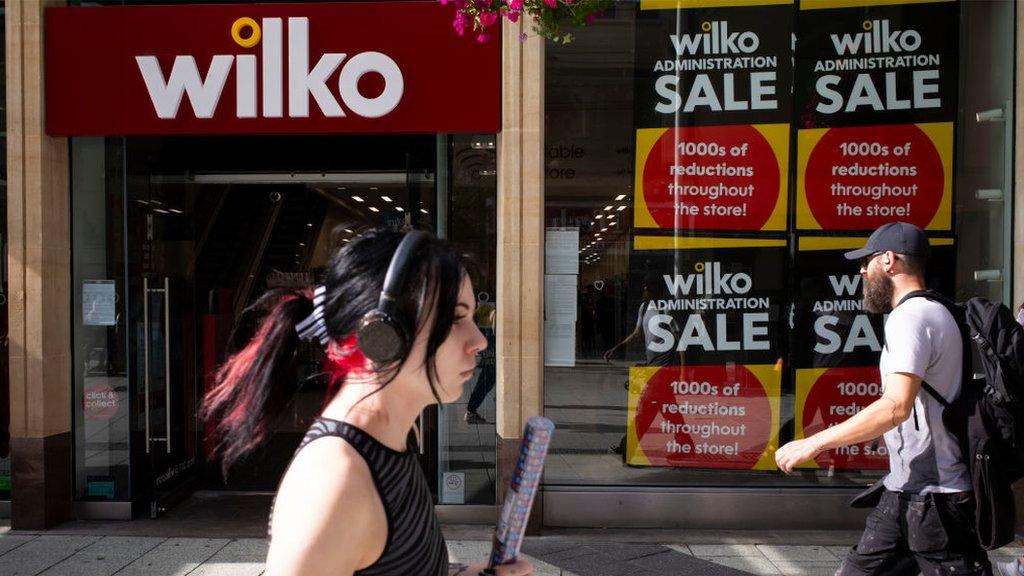'Under siege' Wilko staff fear for jobs while shoppers hit the sales
- Published
- comments

More than 1,300 staff have been made redundant at Wilko so far
"We just do not know. We have no idea if we are going to have a job or not. We are completely in the dark."
Working at Wilko has been tough recently to say the least, with staff anxiously waiting to see if their job will still exist in a few weeks' time.
There are growing doubts about a potential rescue deal for the whole business, with administrators announcing that 52 stores across the country will close next week, resulting in more than 1,000 people being made redundant.
The company has 12,000 employees and so thousands still remain in limbo. Some jobs and stores could still be saved, but deals put forward so far appear to have stalled.
The BBC has spoken to two Wilko workers whose stores avoided the dreaded shut down list revealed on Wednesday, but remain fearful for the future of their branches, and more importantly, their jobs.
The women agreed to speak to the BBC on the basis of their identity being kept anonymous over concerns of potential repercussions.
One woman who has worked at a Wilko for more than six years said she woke up at three o'clock on Wednesday morning feeling sick with worry over whether her store was one of the 52 to shut.
Having waited anxiously for a phone call that did not come in the end, she learned at around 10:10 that her job was safe for now.
But after an initial feeling of relief, she felt "terrible" thinking of her colleagues at other shops around the country being told they were losing their jobs.
"I felt guilty because if it's not happening to you, it's happening to someone else," she said.
This employee was on her day off when hearing the latest news, but she said work has been "horrendous" since Wilko first issued notice of an intention to enter administration last month.
The company, which was still owned by the Wilkinson family, frantically searched but was unable to find a buyer. Home deliveries were then suspended, supplies halted and administration followed with PwC calling the shots ever since.
Walking into work tearful the day after the collapse of the company, one of the workers said banners were quickly put up at her store along with sale and "everything must go" signs.

Administration saw sales advertised immediately
But staff were not stood around twiddling their thumbs waiting for more news. Both workers told the BBC their respective stores had been "busier than we have been in months", with shoppers on the hunt for bargains amidst many empty shelves.
"The very next day people were in," said one of the workers, describing being constantly asked about items on sale by customers, one of which "effed and jeffed" at her due to his unhappiness at the prices of some items.
"We get a 100 times a day, 'when are you closing?' I say, 'you mean the day I lose my job? I don't know when that is yet,'" she said.
"It's a bit like being under siege," she added. "People have no idea what we are going through. I'm shattered at the moment."
"It's very sad," said the second staff member, who has worked at Wilko for 15 years.
"Nearly half the store is empty. We are getting deliveries but it's only a shelf full," she said. "It's just really sad seeing how the store used to be, to how it is now - there is nothing left."
She explained while 90% of customers have been sympathetic some people have been "getting very nasty because they want a bargain".

Empty shelves have recently become a common sight in Wilko stores
Despite being in administration, staff are still being asked to put holiday requests in and are also being given rota schedules four weeks in advance.
"I cannot tell you how difficult it is. We are all busting a gut, all doing extra hours. It's testament to all the other Wilko staff that are working," one of them said.
As well as being rushed off their feet, whispers and rumours about potential takeover deals have not helped things.
While both of them are sitting tight, they said colleagues, mostly less experienced ones, were "putting feelers out" for alternative jobs.
"It is taking its toll," one of them said. "Not just on me but on every member of staff."
"I found it very difficult to get a job, I am classed as disabled and as soon as you put that on an application form a lot of people do not want to hire you. I do have loyalty towards them [Wilko] for that," she added.
A spokesman for administrators at PwC said they were "doing everything we can" to keep staff updated through "regular dialogue with employee representatives as well as calls and updates to the business".
"We are mindful of the confidential nature of the ongoing discussions with interested parties and given the fluid and fast moving-nature of the situation we also want to ensure that all information provided to employees is both relevant and accurate," they added.
"We know that this is an unsettling and uncertain time for all Wilko team members and greatly appreciate the dedication and patience they've shown since the start of the administration."
Wilko had been struggling for some time with heavy losses before it collapsed into administration.
The discount chain was founded in 1930 in Leicester and by the 1990s had become one of Britain's fastest-growing retailers.
But the brand, a stalwart of the High Street for decades, has faced strong competition in recent years from rivals including B&M, Poundland and Home Bargains.
The location of the majority of Wilko stores, in those High Streets which are struggling to attract shoppers, has also had an impact, with competition from suburban retail parks offering easier car parking.
'It's the hope that kills you'
One of the staff members said looking back now, there were signs that things "were not quite right" at the company.
"It did used to be a really good company to work for," she says. "We were paid well over the minimum wage."
Staff also got "perks" she added, including staff discount, a Christmas meal paid for and vouchers, but those days have since passed.
"You used to get a lot of perks just to say thank you for doing your job well, gradually that's got less and less over the years."
The staff member said she felt "let down" by Wilko's owners, and both staff members the BBC spoke with said they do not have much faith in reports of a potential rescue deal.
"It's just a nightmare," said one. "It's the hope that kills you."
Additional reporting from Kris Bramwell, BBC News
Related topics
- Published5 September 2023

- Published5 September 2023
